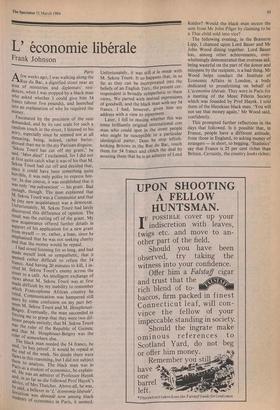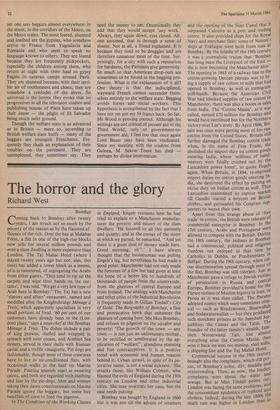L' economie liberale
Frank Johnson
Paris Afew weeks ago, I was walking along the
Rue du Bac, a dignified street near an area of ministries and diplomats' resi- dences, when I was stopped by a black man Who asked whether I could give him 54 francs (about five pounds), and launched into an explanation of why he required the money.
Fascinated by the precision of the sum demanded, and by its vast scale for such a random touch in the street, I listened to his story, especially since he seemed not at all menacing, being, indeed, rather better- dressed than me in the my Parisian disguise. Sekou Tour& has cut off my grant,' he Said. 'Mon dieur I exclaimed, for I did not at first quite catch what it was of his that M. Sekou Toure had cut off and decided that, since it could have been something quite horrible, it was only polite to express hor- ror. In due course, it was established that it was only 'ma subvention' — his grant. Bad enough, though. The man explained that M. Sekou Toure was a Communist and that he (my new acqaintance) was a democrat. Unfortunately, M. Sekou Toure had lately discovered this difference of opinion. The result was the cutting off of the grant: My new acqaintance offered further details in support of his application for a new grant from myself — or, rather, a loan, since he emphasised that he was not seeking charity and that the money would be repaid. I had stood listening for so long, and had made myself look so sympathetic, that it seemed rather difficult to refuse the 54 francs. And having 20 minutes to kill, I in- vited M. Sekou Toure's enemy across the street to a cafe. An intelligent exchange of views about M. Sekou Toure was at first Made difficult by my inability to remember which Francophone African country he ruled. Communication was hampered still more by some confusion on my part bet- ween M. Sekou Toure and M. Houphouet- a,.°IgnY. Eventually, the man succeeded m
'arcing me to
dif-
ferent grasp that they were two dif- people entirely; that M. Sekou Toure was the ruler of the Republic of Guinea; and that M. Houphouet-Boigny was the ruler of somewhere else. .The black man needed the 54 francs, he tsaid, `to buy petrol'. It would be repaid at _he end of the week. No doubt there were them in this reasoning, but I did not subject
em. to analysis. The black man was in L,aris as a student of economics, he explain- ‘ru_ ' was an admirer of Professor Hayek and., in so far as she followed Prof Flayek's a. dvice, of Mrs Thatcher. Above all, he was, _he said a believer in economic liberate'. Socialism was demode now among black of economics in Paris, it seemed. Unfortunately, it was still a la mode with M. Sekou Toure. It so happens that, in so far as they can be incorporated into the beliefs of an English Tory, the present cor- respondent is broadly sympathetic to these views. We parted with mutual expressions of goodwill, and the black man with my 54 francs. I had, however, given him my address with a view to repayment.
Later, I fell to musing whether this was some brilliantly original international con man who could spot in the street people who might be susceptible to a particular ideological patter. Does he stop leftish- looking Britons in the Rue du Bac, touch them for 54 francs and clinch the deal by assuring them that he is an admirer of Lord Kaldor? Would the black man secure the sum from Mr John Pilger by claiming to be a Thai child sold into vice?
The following evening, in the Brasserie Lipp, I chanced upon Lord Bauer and Mr John Wood dining together. Lord Bauer has, among other achievements, over- whelmingly demonstrated that overseas aid, being wasteful on the part of the donor and misspent by the recipient, is a bad thing. Mr Wood helps conduct the Institute of Economic Affairs in London, a body dedicated to proselytising on behalf of L'economie liberale. They were in Paris for a meeting of the Mont Pelerin Society which was founded by Prof Hayek. I told them of the Hayekian black man. 'You will not see that money again,' Mr Wood said, confidently.
This prompted further reflections in the days that followed. Is it possible that, in France, people have a different attitude, from those in England, to asking money of strangers — in short, to begging. 'Statistics' say that France is 25 per cent richer than Britain. Certainly, the country looks richer;
yet one sees beggars almost everywhere: in the street, in the corridors of the Metro, on the Metro trains. The most feared, shunned and loathed are the gypsies, who somehow arrive in France from Yugoslavia and Romania and who seem to speak no language known to others. They are feared because they are frequently pickpockets, especially the children among them, who return at night with their haul to gypsy Fagins in caravan camps around Paris. They are shunned because, with their terri- ble air of rootlessness and chaos, they are somehow a reminder of the abyss. So universal is the horror they evoke that no progressives in all the television studios and publishing houses of Paris have taken up their cause — the plight of El Salvador being much safer ground.
Though the welfare state is as advanced as in Britain — more so, according to British welfare state buffs — many of the beggars are youngish Frenchmen. Fre- quently they chalk an explanation of their troubles on the pavement. They are unemployed, they sometimes say. They
need the money to eat. Occasionally they add that they would accept 'any work.' Always, they squat down, eyes closed. Ah, one assumed, that is through a sense of shame. Not at all, a friend explained. It is because they tend to be druggies and are therefore comatose most of the time. Sur- prisingly, for a city with such a reputation for hardness, the Parisians give generously. So much so that American drop-outs are sometimes to be found in the begging pro- fession. What is the explanation of it all? One theory is that the indisciplined, wayward French cannot surrender them- selves entirely to the welfare state. Begging avoids forms and social workers. This hypothesis is strengthened by the fact that I have not yet got my 54 francs back. So far, Mr Wood is proving correct. Although his writings are not critical of private aid to the Third World, only of government-to- government aid, I feel too that once again Lord Bauer may have been vindicated. Since my meeting with the student from Guinea, M. Sekou Toure has died — perhaps by divine intervention.















































 Previous page
Previous page